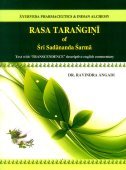Rasatarangini, Rasataraṅgiṇī, Rasa-tarangini: 1 definition
Introduction:
Rasatarangini means something in Hinduism, Sanskrit. If you want to know the exact meaning, history, etymology or English translation of this term then check out the descriptions on this page. Add your comment or reference to a book if you want to contribute to this summary article.
Languages of India and abroad
Sanskrit dictionary
Source: Cologne Digital Sanskrit Dictionaries: Aufrecht Catalogus Catalogorum1) Rasataraṅgiṇī (रसतरङ्गिणी) as mentioned in Aufrecht’s Catalogus Catalogorum:—alaṃk. by Bhānudatta. [Mackenzie Collection] 115. Io. 699. 2021. 2238. 3198. W. p. 228. Oxf. 213^a. L. 1291. Khn. 52. K. 102. B. 3, 54. Ben. 37. Kāṭm. 8 (and—[commentary]). Rādh. 22. NW. 622. Burnell. 57^a. Bhr. 651. H. 178. Oppert. 2007. 3346. 4039. 4241. 5621. 5757. 6647. 8203. Ii, 5700. 5777. 6140. Rice. 288. W. 1726.
—[commentary] Oppert. 3466.
—[commentary] Rasasetu. Rādh. 41.
—[commentary] by Ayodhyāprasāda. NW. 618.
—[commentary] Naukā by Gaṅgārāma Jaḍe. Io. 120. K. 100 B. 3, 54. Rādh. 41. 45. Oppert. 2362. 6601. Ii, 2944.
—[commentary] Rasodadhi by Gaṇeśa. B. 3, 54.
—[commentary] Setubandha by Jīvarāja. K. 106.
—[commentary] by Nāgeśa. Kāvyamālā.
—[commentary] Kāvyasudhā by Nemiśāha. W. p. 229. B. 3, 54. NW. 610. Poona. 206.
—[commentary] Nūtanatari by Bhagavadbhaṭṭa. K. 100.
—[commentary] by Bhānudatta. Oppert. Ii, 5995.
—[commentary] Rasodadhi by Mahādeva. K. 104.
—[commentary] Rasikarañjinī by Veṇīdatta, composed in 1553. Io. 1703. K. 104. B. 3, 54. Oudh. Xv, 62. 64. Np. Ii, 122. Oppert. 2684. 3468.
2) Rasataraṅgiṇī (रसतरङ्गिणी):—a
—[commentary] on Rudra's Śṛṅgāratilaka, by Gopāla Bhaṭṭa.
3) Rasataraṅgiṇī (रसतरङ्गिणी):—alaṃk. by Bhānudatta. Bl. 149. Cu. add. 2429. 2435. Gov. Or. Libr. Madras 74. L. 3377. Oudh. Xx, 98. Stein 63.
—[commentary] Naukā by Gaṅgārāma Jaḍe. [Bhau Dāji Memorial] 112. Bl. 149. Oudh. Xx, 100. Stein 63.
—[commentary] by Dinakara. Rgb. 532.
—[commentary] Rasikarañjinī by Veṇīdatta. Gov. Or. Libr. Madras 74. Oudh. Xxi, 76. Xxii, 72.
4) Rasataraṅgiṇī (रसतरङ्गिणी):—alaṃk. by Bhānudatta. Ulwar 1069. 1070.
—[commentary] Setu by Jīvarāja, son of Vrajarāja Dīkṣita. Ulwar 1070. Extr. 226.
—[commentary] Rasikarañjinī by Veṇīdatta. Ulwar 1071.
5) Rasataraṅgiṇī (रसतरङ्गिणी):—alaṃk. by Bhānudatta. As p. 159. Bd. 603. L.. 835-838. 839 (inc.). 840. Peters. 5, 415. C. Setu by Jīvarāja. Ak 702 (inc.). Peters. 5, 415. C. Sāhityasudhā by Nemisāha. As p. 159. C. Rasikarañjinī by Veṇīdatta. As p. 159.
Sanskrit, also spelled संस्कृतम् (saṃskṛtam), is an ancient language of India commonly seen as the grandmother of the Indo-European language family (even English!). Closely allied with Prakrit and Pali, Sanskrit is more exhaustive in both grammar and terms and has the most extensive collection of literature in the world, greatly surpassing its sister-languages Greek and Latin.
See also (Relevant definitions)
Partial matches: Tarangini, Rasa, Raca.
Ends with: Navarasatarangini.
Full-text (+3): Sahityasudha, Navarasatarangini, Kavyasudha, Mahamusha, Bhanudatta, Kajjali, Bhavana, Khalvayantra, Damaruyantra, Curnodaka, Ganeshvara, Bhanga, Citraka, Ganapati, Gunja, Ahiphena, Dhattura, Bhallataka, Kupilu, Shringaratilaka.
Relevant text
Search found 2 books and stories containing Rasatarangini, Rasataraṅgiṇī, Rasa-tarangini, Rasa-taraṅgiṇī; (plurals include: Rasataranginis, Rasataraṅgiṇīs, taranginis, taraṅgiṇīs). You can also click to the full overview containing English textual excerpts. Below are direct links for the most relevant articles:
Kshetrayya, The Enlightened < [January 1966]
Kshetrayya, The Enlightened < [January 1966]
The Padma Purana (by N.A. Deshpande)
Chapter 74 - Arjuna’s Wish and Its Fulfilment < [Section 5 - Pātāla-Khaṇḍa (Section on the Nether World)]
Related products


